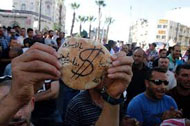
Protests throughout the West Bank over rising fuel and commodity prices have swept major West Bank cities, with protesters calling for the resignation of the government and Prime Minister Salam Fayyad.
On September 6, Fayyad, who has come under fire by protesters and some say by Fatah, addressed the nation in a press conference. Countering President Mahmoud Abbas’ characterization of the economic protests as the “start of the Palestinian Spring” Fayyad said it was no such thing.
"We will not reproduce the Arab Spring here, because we are not a state," he said.
A day later, Fayyad posted on his official Facebook account to address concerns.
"We cannot fix the prices of goods because their demand will be increased with less supply ... This might expose traders to lose their money," he wrote.
"Importing oil from other countries, is a good proposal, but will not lead to lower prices," he said, while insisting that the PA continues to sell fuel below market rates.
He also wrote: "I know we are going through a difficult time, and I hope this will be fixed as soon as possible."
Amid calls for his resignation, the PM played it cool and smart. On September 6 he said he would resign if that was the “will of the people,” but warned that replacing figures was not the solution to the financial crisis; rather a new economic strategy was needed. He also partially blamed Israel’s restrictions on Palestinians as one reason for the paralyzed economic growth, even though he said he was “hurt “by the demands for his removal.
The protests, which took place in Hebron, Ramallah and Bethlehem, took a disturbing turn this week with three attempts at self-immolation. On September 2, Ehab Abu Nada, 18, who had been looking for a job in vain, doused himself in petrol and set himself on fire in front of Gaza City's Shifa Hospital. He died on the same day.
"He left to seek work and he did not come back. My heart was shattered," his father told a local radio station.
On September 3 Hasan Qahwaji tried to set himself and his six-year-old daughter on fire in Ramallah. Luckily, bystanders stopped him before he was detained by police.
Local sources said Qahwaji could not afford his daughter's cancer treatment, although President Abbas' office said he had received financial support from the PA and other sources including treatment for his daughter in Jordan.
Then on September 4, in Hebron, 42-year-old Khaled Abu Rabee entered a municipality building and covered himself in gasoline. He was also stopped by a security guard before setting himself alight.
On September 6, taxi drivers, held a two and a half hour strike during the morning rush hour, causing chaos and delays. Protesters have been calling on the PA to abolish the Paris Protocol, which they said was largely to Israel’s benefit.
Between September 5 and 6, six Palestinians including two brothers have been killed in Israeli airstrikes in Gaza, which Israel said was a response to rocket fire from the Strip. Hamas spokesman Fawzi Barhoum said the airstrikes were "unjustified," and came after Egyptian President Mohammad Mursi delivered a speech affirming his support for the Palestinian cause.
"Muhammad Mursi and the Arab League supported the Palestinian people," Barhoum said. "Israel's attacks are aimed at testing the Arab position."
On September 7, three Palestinian refugees were killed in the Yarmouk Camp in Damascus during Syrian army shelling. The killings came one day after an UNRWA employee and his son were killed in their home on al-Jaouna street, both Palestinian refugees.
At least nine Palestinian refugees were among 20 people killed on September 6, local sources said.
Also on September 6, security services said they have detained suspects believed to be behind the shooting death of Hisham al-Rukh, a senior security commander in Jenin earlier in the week.
"There are some suspects who were detained for investigation, and there are security organizations working with us in the investigation process," Adnan al-Dmeiri said.
Meanwhile, Israeli settlers kept up their rampages in the West Bank. On September 7,
settlers set fire to around 130 olive and almond trees in the northern West Bank village of Qaryout, local sources said.
Residents of the Immanuel settlement set the orchards ablaze while residents were at Friday prayers.
On September 2, Israeli settlers took over a room in the Hamdallah home in Ras Al Amoud under tight Israeli police and army protection. Peace Now warned that the move was a precursor for a larger settlement plan in the area, including the construction of 20 new housing units on the ruins of the entire house.
On September 5, European Union representatives said they were concerned by the rising number and severity of "continuous settler violence and deliberate provocations against Palestinian civilians." The EU missions in Jerusalem and Ramallah called on Israel to prevent settler violence, protect Palestinians, and bring perpetrators to justice.
A boat carrying immigrants sunk on September 6 just tens of meters off of Turkey's western Aegean coast. According to sources from the Palestinian embassy in Turkey, around 12 Palestinians survived but it was still unclear as to how many were among the casualties. Over 60 migrants were killed when the overcrowded boat sank.
Finally, on September 5, Democrats reinstated language into the party platform declaring Jerusalem to be the capital of Israel. The move came after Republicans accused them of showing weak support for Israel. A Democratic official said the reinstatement of the term reflected the “personal view of President Barack Obama.”







